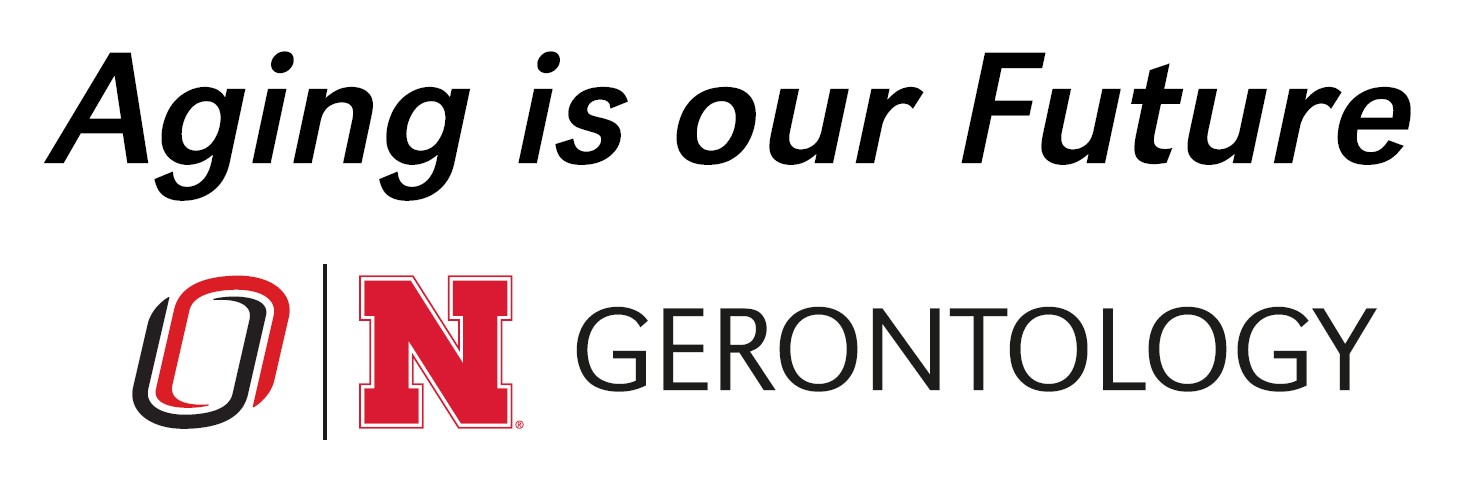What is the current state of gerontology programs in the United States at the undergraduate and graduate levels? Research assistants within the Department of Gerontology on the UNL campus undertook the task of digging through websites and Google searches to find this answer. Their searchable database of gerontology programs in the United States is now available and includes such designations as AGEC (Accreditation for Gerontology Education), POM (Program of Merit), and AFU (Age Friendly University). The database is updated throughout the academic year. Program additions and deletions are also noted on the last worksheet of the database.
We are grateful to the following research assistants for their efforts: (2021 – 2022) Monica Bolin Grant (Champion of Aging) and Lauren O’Leary, (2022-2023) Anna Larsen and Kristin Johnson (2023-2024) Mark Staley and Ashton Erickson, (2024-2025) Mark Staley, Elsa Wilcox, and Hailey Baca, and (2025-2026) Hailey Baca, Jill Parr, and Ava Williams.
A very special thanks to Terry and Judy Haney for their financial support of this project through the Terry Haney Chair of Gerontology funds.
View the gerontology program database.
History of the Database
When two gerontology faculty, Dr. Rona Karasik (St. Cloud State University) and Dr. Julie Masters (UNO), were writing a chapter on master’s programs in gerontology for the seventh edition of the AGHE Standards and Guidelines, they were interested in knowing how many Gerontology programs there were in the United States. Having this number could serve as an indicator of growth or maintenance in the field for their project. A review of various databases led them to consider the value of creating a searchable document that would be useful for their current and future interests along with others in the field of gerontology.
Enter the Gerontology Research Assistants. Drawing on the research and organizational skills of Monica Bolin Grant, who was a service year member of the Champions of Aging program through Home Instead, and Lauren O’Leary, an undergraduate research assistant and gerontology certificate student in the Department of Gerontology on the University of Nebraska-Lincoln campus, the team created an Excel database to list current programs in gerontology at the undergraduate and graduate levels. The following methodology was used by the “Gero Database Team” to identify active programs in the United States:
The search conducted by the “Gero Database Team” began by state, starting with Alabama and proceeding in alphabetical order. To identify lists of a state’s colleges and universities, the team utilized a general Google search. This generated lists directly from Google, but the preferred result was a state government’s education department’s compiled higher education list. When not available, the team had to piece together lists to make sure to analyze all institutions, especially in the case of community colleges. After lists of the state’s universities and colleges were located, the team went through each educational institution’s website, specifically looking in their academics tab searching for a thorough list of programs. If this was not available, the team used the search bar and entered keywords to identify any Gerontology programs in that city/state. Keywords included: gerontology, gero, aging, and aging studies. If the search identified potential programs, the team explored them further to ensure that the program was still active. Ongoing research has tapped into AI to help with searches, but the results have not been as detailed as the work of the research assistants..
After Lauren O’Leary’s graduation in May 2022, Anna Larsen, the new undergraduate research assistant, overtook the responsibility of the database. She got to work with goals in mind of making the database even more inclusive and detailed. The “Version 2.0” of the database was completed and posted to the website with Anna’s edits and additions to the original version. Among the most notable changes include: adding eighteen Minors, nine Graduate Certificates, five Master’s, and one Ph.D. program; creating a separate “Community College” tab to highlight 13 Associate and 46 Certificate of Achievement programs; identifying Programs of Merit (POM) of the Gerontological Society of America and programs accredited by the Gerontology Education Council (AGEC). As the document is ever-evolving, Anna and additional research assistant, Kristin Johnson, developed a “Version 3.0” to add even more types of programs such as geriatric nurse practitioner, and medical fellowships. The current research assistants, Mark Staley and Ashton Erickson are focusing on adding such details as Age Friendly Universities (AFU) and identifying programs that have closed but are still offering coursework in gerontology that led to Version 4.0.
The current product is a database that lists if each program category is available at individual institutions. Because the team was interested in identifying only Gerontology specific programs in this version, not included are those with a gerontology concentration tied to another degree. Readers can find a link to each program’s website as well as contact information for each program as found on their website. Persons wanting to make any corrections to their entry will want to ensure their website is up to date so the database will refer people to the most current information.
As of 2025, the database includes new categories to include community colleges, HBCUs, and Occupational Therapy and Physician Assistant programs with coursework and/or geriatric fellowships. The team added a column for online programs and for those interested, a listing of study abroad programs. The user should note some entries are still under construction.
